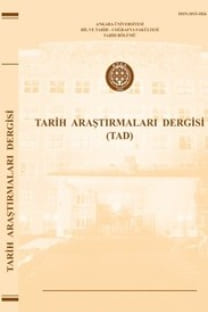Arkaik ve klasik kaynaklarda Hellen olmayan Polis'ler
Hellence “Polis” kelimesi ana hatlarıyla "yerleşimin merkezinde ve kırsalında yaşayan yurttaşlardan oluşan ve bunların oylarıyla yönetilen, dışa karşı bağımsız politik toplumu ifade ettiği şeklinde ele alınır; bu yönüyle de Polisin genellikle Hellen dünyasına özgü, politik bir terim olduğu kabul edilmektedir. Ancak antik Hellence belgelerle üzerinde yapılan ayrıntılı çalışmalar bu terimin ve kavramın sadece "politik toplum" anlamını içermediğini, hatta sadece Hellen dünyasına özgü yerleşim ve yönetimler için de kullanılmadığını ortaya koymaktadır. Çalışmamızda konu Arkaik ve Klasik Dönemlerde güneybatı Anadolu yerleşimlerinden örneklerle ele alınmaktadır
Anahtar Kelimeler:
Likya, Karia, Kilikia, Polis, Polis Hellenis
NON-GREEK POLEIS IN ARCHAIC AND CLASSICAL SOURCES
In its strict sense, the Hellenic term Polis means, independent and a small selfgoverning community of citizens living in an urban centre and its hinterland, and in this sense it is a politic term which is originally specific to Hellenic world. But the studies on this term have shown that in the ancient sources this term wasn't used only in that political meaning and furthermore it wasn't used only for the settlements and administrations specific to Hellenic world. In this study, this subject will be described with the references from south-western Anatolian settlements within the Archaic and Classical periods.
Keywords:
Lycia, Caria, Cilicia, Polis, Polis Hellenis.,
___
- ATL : The Athenian Tribute Lists, Meritt, B. D., Wade- Gery, H.T., McGregor, M. F., 4 vols., Cambridge, 1939-1953.
- Finley, M. I., Early Greece: The Bronze and Archaic Ages, N.Y., 1981.
- FGrH: Fragmente der griechischen Historiker, F. Jacoby (ed.), Berlin, 1923-1958.
- ——, Polis: An Introduction to the Ancient Greek City States, Oxford, 2006 Hansen, M. H., Nielsen, T. H. (ed.), An Inverntory of Archaic and Classical Poleis, Oxford, 2004.
- Hdt.: Herodotos, Histories, Godley, A.D. (çev.), Cambridge, 1999 (Loeb Classical Library).
- Ksen. Anab., Ksenophon Anabasis, C.L. Brownson (çev.), vol.3, Cambridge, London, 2001 (The Loeb Classical Library).
- Ksen. Cyr., Ksenophon Cyropaedia, W. Miller (çev.), vol. 5, Cambridge, 1968 (The Loeb Classical Library).
- OCD, 2012: S. Hornblower, A. Spawforth, E. Eidinow (ed.), The Oxford Classical Dictionary, Oxford, 2012.
- Ksenophon, Yunan Tarihi, S. Sinanoğlu (çev.), Ankara, 1999.
- Skylaks, Pseudo- Skylaks, Periplous. Graham Shipley (ed.), Pseudo-Skylax's Periplous: the Circumnavigation of the Inhabited World. Text, Translation and Commentary. Exeter: Bristol Phoenix Press, 2011.
- Thuc.: Thucydides, History of the Peloponnesian War, Smith, Charles Foster (çev.), London 1958 (Loeb Classical Library).
- Tsetskhladze, Gocha R., Snodgrass, A. M., Greek Settlements in the Eastern Mediterranean and the Black Sea, Michigan, 2002.
- Whitley, J., The Archaeology of Ancient Greece, Cambridge, 2001.
- Zoroğlu, L., Kelenderis I, Kaynaklar, Kalıntılar, Buluntular, Ankara 1994.
- ISSN: 1015-1826
- Yayın Aralığı: Yılda 2 Sayı
- Başlangıç: 1963
- Yayıncı: Levent KAYAPINAR
Sayıdaki Diğer Makaleler
Yeni bilgi ve belgeler ışığında Kaplan[Zade] Ahmed Saib (1860–1918)
Kazakistan’ın bağımsızlığının tanınma süreci ve Türk kamuoyundaki yankıları
Abdullah GÜNDOĞDU, Cafer GÜLER
KASTAMONU- TAŞKÖPRÜ'DE ÇOBANOĞLU MUZAFFEREDDİN YAVLAK ARSLAN MEDRESESİ VE CAMİİ
Hititçe çivi yazılı metinlerde çörek otuna ilişkin bir öneri
KAZAKİSTAN'IN BAĞIMSIZLIĞININ TANINMA SÜRECİ VE TÜRK KAMUOYUNDAKİ YANKILARI
Cafer GÜLER, Abdullah GÜNDOĞDU
Kastamonu- Taşköprü’de Çobanoğlu Muzaffereddin Yavlak Arslan Medresesi ve Camii
Arkaik ve klasik kaynaklarda Hellen olmayan Polis'ler
Konsolos yardımcısı C.H. Dickson’un Trablus’tan Gademis’e seyahatine dair raporundan alıntı (1852)
